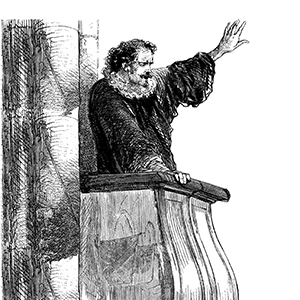The explanation of this boneless, nerveless, jelly-fish condition of soul (that we see today) is not difficult to find. To begin with, the heart of man is naturally in the dark about religion – has no intuitive sense of truth – and really needs instruction and illumination. Beside this, the natural heart in most men hates exertion in religion and cordially dislikes patient, painstaking enquiry. Above all, the natural heart generally likes the praise of others, shrinks from collision, and loves to be thought charitable and liberal. The whole result is that a kind of broad religious “agnosticism” just suits an immense number of people, and specially suits young persons. They are content to shovel aside all disputed points as rubbish, and if you charge them with indecision, they will tell you: “I do not pretend to understand controversy; I decline to examine controverted points. I daresay it is all the same in the long run” Who does not know that such people swarm and abound everywhere?
Now I do beseech all who read this paper to beware of this undecided state of mind in religion. It is a pestilence that walketh in darkness, and a destruction that killeth in noonday. It is a lazy, idle frame of soul which, doubtless, saves men the trouble of thought and investigation, but it is a frame of soul for which there is no warrant in the Bible. For your own soul’s sake dare to make up your mind what you believe, and dare to have positive distinct views of truth and error. Never, never be afraid to hold decided doctrinal opinions; and let no fear of man, and no morbid dread of being thought party spirited, narrow, or controversial, make you rest contented with a bloodless, boneless, tasteless, colourless, lukewarm, undogmatic Christianity.
Mark what I say. If you want to do good in these times, you must throw aside indecision, and take up a distinct, sharply-cut doctrinal religion. If you believe little, those to whom you try to do good will believe nothing. The victories of Christianity, wherever they have been won, have been won by distinct doctrinal theology; by telling men roundly of Christ’s vicarious death and sacrifice; by showing them Christ’s substitution on the cross, and His precious blood; by teaching them justification by faith, and bidding them believe on a crucified Saviour; by peaching ruin by sin, redemption by Christ, regeneration by the Spirit; by lifting up the brazen serpent; by telling men to look and live – to believe, repent, and be converted.
This – this is the only teaching which for eighteen centuries God has honoured with success, and is honouring at the present day both at home and abroad. Let the clever advocates of a broad and undogmatic theology – the preachers of the Gospel of earnestness, and sincerity and cold morality – let them, I say, show us at this day an English village or parish, city or town or district which has been evangelized without “dogma” by their principles. They cannot do it, and they never will. Christianity without distinct doctrine is a powerless thing. It may be beautiful to some minds, but it is childless and barren. There is no getting over facts. The good that is done in the earth may be comparitively small. Evil may abound, and ignorant impatience may murmur and cry out that Christianity has failed. But, depend on it, if you want to “do good” and shake the world, we must fight with the old apostolic weapons, and stick to dogma. No dogma, no fruits! No positive Evangelical doctrine, no evangelization!
Mark once more what I say. The men who have done most for the Church in England, and made the deepest mark on their day and generation, have always been men of most decided and distinct doctrinal views. It is the bold, decided, outspoken man, like Capel Molyneux, or our grand old Protestant champion Hugh McNeile, who makes a deep impression, and set people thinking, and “turns the world upside down”. It was “dogma” in the apostolic ages which emptied the heathen temples and shook Greece and Rome. It was “dogma” which awoke Christendom from its slumbers at the time of the Reformation and spoiled the Pope of one third of his subjects. It was “dogma” which over a hundred years ago revived the Church in England in the days of Whitefield, Wesley, Venn, and Romaine, and blew up our dying Christianity into a burning flame … It is doctrine – doctrine, clear, ringing doctrine – which, like the ram’s horns at Jericho, casts down the oppositions of the devil and sin. Let us cling to decided doctrinal views, whatever some may please to say in these times, and we shall do well for ourselves, well for others, well for the Church in England, and well for Christ’s cause in the world.
From The Wicket Gate Magazine, published in the UK, used with permission.

